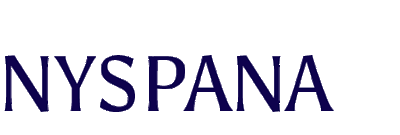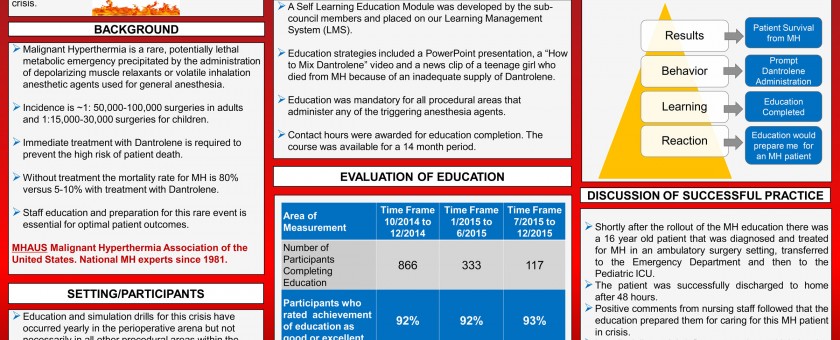“DOES MANDATORY NURSING EDUCATION ON MALIGNANT HYPERTHERMIA ENHANCE NURSING KNOWLEDGE AND LEAD TO POSITIVE PATIENT OUTCOMES?”
Abstract for study:
Team Leader: Debbie Fracassi, MS, RN-BC, Perioperative Services Team Members: Monica Seaman, MS, RN, CAPA, Emergency Department, Nancy Freeland, MS, RN, CCRN Critical Care, Julie Gottfried, MS, RN, CCRN, CPNP-PC, Pediatrics, Heather O’Brien, MS, RN, CNS, Psychiatry
Background Information: Malignant Hyperthermia (MH) is a rare, potentially lethal patient syndrome caused by a hyper-metabolic state that can be precipitated by the administration of volatile inhalation anesthetic agents or depolarizing muscle relaxants. It is essential to be prepared for this rare event that has a very high risk of death to the patient if it occurs without immediate treatment with Dantrium. Education to all nursing staff caring for patients undergoing procedures or surgery that utilize the anesthesia triggering agents is essential. MH education in perioperative services has been ongoing for several years. The hospital’s Nursing Education Council recognized that education should occur in additional areas that may care for this specialized population. A committee was formed consisting of the service educators from pediatrics, critical care, psychiatry, emergency and perioperative services.
Objectives of Project: Determine if an increase in the knowledge and skills of nursing staff to respond emergently to manage a MH crisis leads to positive patient outcomes.
Process of Implementation:
- The self-learning education module was developed by the education committee and placed on the institutions’ online learning management system.
- Education strategies included a PowerPoint presentation, a “how to mix Dantrolene” video and a news clip of a teenage girl who died from MH because of an inadequate supply of Dantrolene. 3. Education was mandatory for all identified areas that administer any of the triggering anesthesia agents and contact hours were awarded for the activity
Statement of Successful Practice: In the first quarter after education was rolled out a total of 866 nursing staff completed the education with very positive comments. Greater than 92% of participants reported good or excellent achievement of the learning objectives. Shortly after the rollout of this education, there was a 16-year-old patient that was diagnosed and treated for MH in an off-site outpatient ambulatory surgical center, transferred to the ED and then to the pediatric ICU. The patient outcome was positive, with discharge to home within 48 hours. Positive comments from nursing staff followed from several different services that the education prepared them for caring for this MH patient in crisis. Interdisciplinary debriefing occurred at multiple levels after the event to review patient care and enhance learning.
Implications for Advancing the Practice of Perianesthesia Nursing: There was Successful Translation of Education to Clinical Practice in the emergent care of the MH patient. By providing the essential education through a variety of strategies, we enhanced new knowledge and skills of our nursing staff to utilize best practices in caring for the rare MH patient.

